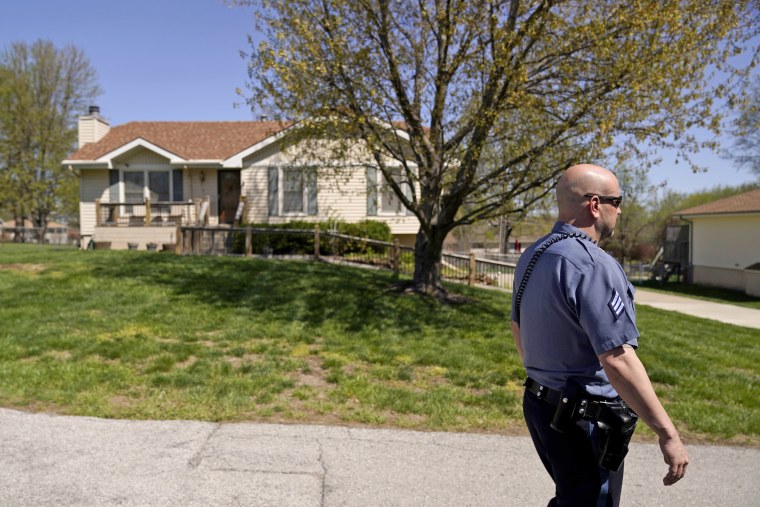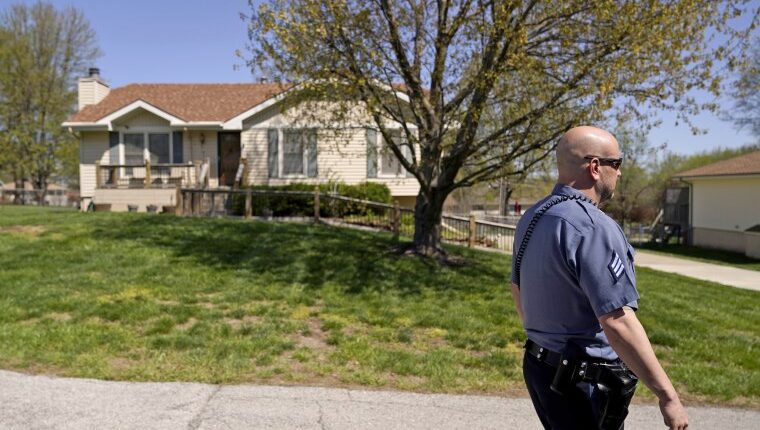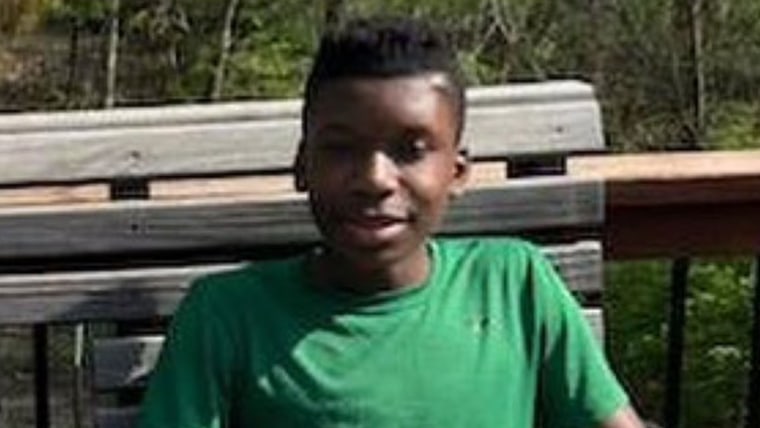Instances of people being gunned down, one fatally, after making a seemingly innocent mistake have once again reignited the debate over “stand your ground” and “castle doctrine” self-defense laws.
Three shootings all happened in the span of six days and involved what some say were harmless occurrences: a Missouri teenager ringing the wrong doorbell while trying to pick up his younger siblings; a group of friends in New York pulling into the driveway of a home they thought belonged to another friend; and a Texas cheerleader accidentally opening the door of the wrong car.
Although “stand your ground” and the “castle doctrine” have not been used publicly as a defense yet in any of these shootings, they highlight the complexity of the laws and how easily they can be misinterpreted.

What does it mean to ‘stand your ground?’
“Stand your ground” laws give a person the right to use lethal force outside of their home when they reasonably perceive a threat is present, NBC News legal analyst Danny Cevallos said.
“‘Stand your ground’ is the idea that as you walk around in the world, as long as you’re doing it lawfully — you’re on the sidewalk or somewhere you’re supposed to be — and somebody attacks you, you don’t have to run away on the street,” he said. “There’s no duty to retreat as long as you are confronted with potentially deadly force.”
In 2005, Florida passed the first “stand your ground” law. Since then, at least 28 states and Puerto Rico have some form of a self-defense law that does not require a person to retreat from an attacker if they are in a place lawfully, according to the nonpartisan National Conference of State Legislatures.
At least 10 of those states have laws that specifically include language that says a person may “stand his or her ground.”
“Stand your ground,” sometimes called “shoot first” laws, have been at the center of a number of high-profile shootings, most notably the 2012 death of Trayvon Martin, the Black teenager who was fatally shot in Sanford, Florida, by George Zimmerman.
Zimmerman, an armed neighborhood watch volunteer, was charged with murder, but acquitted. He claimed self-defense in shooting Martin, who had been walking through the gated community where his father was staying.
Although Zimmerman’s attorneys did not use “stand your ground” as a defense at trial, it thrust the controversial law — long championed by gun lobbyists and the National Rifle Association — into the national spotlight.
The ‘castle doctrine’ explained
The “castle doctrine” applies to a person’s home or property and gives the person the right to defend their home and not retreat or run away.
“The ‘castle doctrine’ is the idea that you don’t have a duty to retreat when you’re in your house,” Cevallos said. “So if you go down to your kitchen at midnight to get a glass of milk and there’s an intruder in there, you don’t have to run away in your own house. You can use deadly force.”
The doctrine came into play in 2019 when a Texas judge directed the jury to consider it in deciding whether then-Dallas Police Officer Amber Guyger had the right to protect herself when she entered the wrong apartment and fatally shot her neighbor, Botham Jean. Guyger said that she mistook Jean’s apartment for her own, walked inside and opened fire, fearing he was a burglar.
She was ultimately found guilty of murder and sentenced to 10 years in prison.
Which states have ‘stand your ground’ and the ‘castle doctrine?’
Texas and Missouri are among the more than 28 states that have laws that say “there is no duty to retreat an attacker in any place in which one is lawfully present,” according to the National Conference of State Legislatures’ website. Those states include Alabama, Alaska, Arizona, Arkansas, Florida, Georgia, Idaho, Indiana, Iowa, Kansas, Kentucky, Louisiana, Michigan, Mississippi, Montana, Nevada, New Hampshire, North Carolina, North Dakota, Ohio, Oklahoma, Pennsylvania, South Carolina, South Dakota, Tennessee, Utah, West Virginia and Wyoming.
Puerto Rico is a “no duty to retreat” territory.
At least 10 of those states — Alabama, Florida, Georgia, Idaho, Kansas, Kentucky, Louisiana, Oklahoma, Pennsylvania and South Carolina — have laws that explicitly say a person can “stand his or her ground,” according to the conference’s website. In eight states, a person is allowed to use deadly force in self-defense.
Missouri law lists several instances when use of force is and is not justified. Generally, it is allowed when a person “reasonably believes that such deadly force is necessary” to protect themselves or when “such force is used against a person who unlawfully enters … or attempts to unlawfully enter a dwelling.”
In Missouri, Kansas City Police Chief Stacey Graves said that investigators will consider whether Andrew Lester is protected by the state’s “stand your ground“ law after allegedly shooting Ralph Yarl, the 16-year-old who rang his doorbell by mistake. Lester was briefly arrested on charges of felony assault and armed criminal action and remains free on $200,000 bail. He has pleaded not guilty.
Lester, 84, said he was going to bed when he heard the doorbell ring and saw a Black male he didn’t know pulling on the exterior storm door handle. He said he grabbed his gun and fired, believing his home was being broken into, according to a probable cause statement filed by police.
Yarl, who was wounded in the head and arm, said he did not pull on the door handle and told investigators he heard a voice say, “Don’t come around here.” An attorney for Lester has not said if he will use the “stand your ground” law as a defense, and has not returned NBC News’ requests for comments.
Texas, where two cheerleaders were shot after one got into the wrong car, has a similar law.

The suspect in that shooting, Pedro Tello Rodriguez Jr., fired into the cheerleaders’ vehicle. He was arrested on charges of deadly conduct. Attorney information was not available for him.
In New York, where Kaylin Gillis, 20, was fatally shot after her boyfriend pulled into the wrong driveway, the law imposes a duty to retreat before using deadly force when in public. Under the “castle doctrine,” New Yorkers are allowed to protect their home with deadly force if they reasonably believe there is a threat.
Gillis’ boyfriend told NBC News on Tuesday that he was behind the wheel and was leaving the home in Hebron, about 50 miles north of Albany, when the homeowner opened fire on their car.
The suspect, Kevin Monahan, 65, was charged with second-degree murder and pleaded not guilty. Kurt Mausert, Monahan’s attorney, previously said that his client did not intend to hurt anyone when he fired. On Thursday, Mausert declined to discuss any possible defense strategies, but noted that under New York’s “castle doctrine,” a person does not have a duty to retreat on their property before using deadly force.
When can these laws be used?
Because “castle doctrine” and “stand your ground” laws vary across states, it can be difficult to define what may be protected.
“There’s all sorts of criminality that would not fall under ‘stand your ground.’ … It depends on the case,” said Robert Spitzer, author and distinguished service professor emeritus of political science at the State University of New York, Cortland.
“On the other hand, there are many criminal circumstances where those involved in criminality do make a ‘stand your ground’ claim,” he said.
In the Kansas City shooting, Spitzer said he believes the laws could come into play because Lester was at his home and told authorities that he believed his life was in danger.
“Those two claims together, I think, make for a powerful defense for him,” Spitzer, who has written six books on gun policy, said.
Cevallos, on the other hand, said he thinks Lester could have a stronger case under the “castle doctrine.”
“I get that a lot of folks are already talking about ‘stand your ground,’ the defense hasn’t even asserted it, but I don’t think it applies,” he said.
Both Spitzer and Cevallos agreed that the defense team in the New York shooting may have a difficult time building a case under the self-defense laws.
“It’s perfectly normal that people pull into a driveway, sometimes even to turn around. It’s not considered trespassing,” Cevallos said. “There doesn’t appear to be any way that ‘castle doctrine’ would apply.”
Cevallos said using a “stand your ground” defense in the Texas case was “not a home run.”
Spitzer agreed, but added he “wouldn’t dare predict that outcome.”
Source: | This article originally belongs to Nbcnews.com










